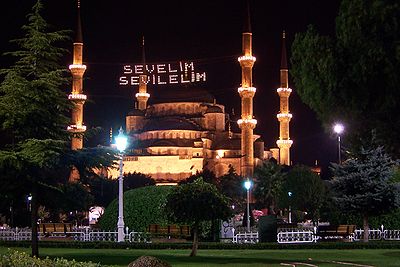.gif)
Bayram (Turkey)
Encyclopedia


Turkic languages
The Turkic languages constitute a language family of at least thirty five languages, spoken by Turkic peoples across a vast area from Eastern Europe and the Mediterranean to Siberia and Western China, and are considered to be part of the proposed Altaic language family.Turkic languages are spoken...
word for a nationally celebrated festival or holiday, applicable to both national (i.e. secular) or religious celebrations. In accordance with this dual applicability, the method with which one determines the yearly timing of Bayrams is different for national and religious holidays.
State holidays in Turkey have set dates under the nationally-used Gregorian Calendar
Gregorian calendar
The Gregorian calendar, also known as the Western calendar, or Christian calendar, is the internationally accepted civil calendar. It was introduced by Pope Gregory XIII, after whom the calendar was named, by a decree signed on 24 February 1582, a papal bull known by its opening words Inter...
, while the religious holidays are coordinated and publicly announced in advance by the Government's Presidency of Religious Affairs
Diyanet Isleri Baskanligi
In Turkey, the Presidency of Religious Affairs is an official institution established in 1924 after the abolition of the caliphate. Founded by the Grand National Assembly of Turkey as a successor to Sheikh ul-Islam, it represents the highest Islamic religious authority in the country...
department according to the Lunar Calendar
Islamic calendar
The Hijri calendar , also known as the Muslim calendar or Islamic calendar , is a lunar calendar consisting of 12 lunar months in a year of 354 or 355 days. It is used to date events in many Muslim countries , and used by Muslims everywhere to determine the proper day on which to celebrate Islamic...
, and are subsequently accommodated into the national Gregorian Calendar, which results in the dates for religious holidays changing every year with a shift margin of approximately 11 days.
Large scale non-Turkish or non-Islamic traditions and celebrations may similarly be called Bayram, as illustrated by Halloween
Halloween
Hallowe'en , also known as Halloween or All Hallows' Eve, is a yearly holiday observed around the world on October 31, the night before All Saints' Day...
being referred to as "Cadılar Bayramı" (i.e. "Bayram of Witches"), Easter
Easter
Easter is the central feast in the Christian liturgical year. According to the Canonical gospels, Jesus rose from the dead on the third day after his crucifixion. His resurrection is celebrated on Easter Day or Easter Sunday...
as "Paskalya Bayramı" (i.e. "Easter Bayram") or "Hamursuz Bayramı" ("No-flour Bayram", used by Jews), Christmas
Christmas
Christmas or Christmas Day is an annual holiday generally celebrated on December 25 by billions of people around the world. It is a Christian feast that commemorates the birth of Jesus Christ, liturgically closing the Advent season and initiating the season of Christmastide, which lasts twelve days...
as "Noel Bayramı" (i.e. "Christmas Bayram"), or Hanukkah
Hanukkah
Hanukkah , also known as the Festival of Lights, is an eight-day Jewish holiday commemorating the rededication of the Holy Temple in Jerusalem at the time of the Maccabean Revolt of the 2nd century BCE...
as "Yeniden Adanma Bayramı" (i.e. "Renewal/Rededication Bayram"). However, not every special occasion or holiday is referred to as a Bayram, as illustrated by the case of World Health Day
World Health Day
World Health Day is celebrated every year on 7 April, under the sponsorship of the World Health Organization .In 1948, the World Health Organization held the First World Health Assembly. The Assembly decided to celebrate 7 April of each year, with effect from 1950, as the World Health Day...
or Liberation of Istanbul, among others. Also many Albanian Muslims
Islam in Albania
During the Ottoman rule, according to Ottoman data, the majority of Albanians were of Muslim affiliation . However, decades of state atheism which ended in 1991 brought a decline in religious practice in all traditions....
and Bosnian Muslims
Bosniaks
The Bosniaks or Bosniacs are a South Slavic ethnic group, living mainly in Bosnia and Herzegovina, with a smaller minority also present in other lands of the Balkan Peninsula especially in Serbia, Montenegro and Croatia...
refer only to Eid ul-Fitr
Eid ul-Fitr
Eid ul-Fitr, Eid al-Fitr, Id-ul-Fitr, or Id al-Fitr , often abbreviated to Eid, is a Muslim holiday that marks the end of Ramadan, the Islamic holy month of fasting . Eid is an Arabic word meaning "festivity," while Fiṭr means "breaking the fast"...
as "Bayram", most likely because of the enduring Ottoman Turkish
Ottoman Empire
The Ottoman EmpireIt was usually referred to as the "Ottoman Empire", the "Turkish Empire", the "Ottoman Caliphate" or more commonly "Turkey" by its contemporaries...
influence in the Balkans due to several centuries of Ottoman rule.
National festivals of Turkey
- New Years' Day ("Yılbaşı" or "Yılbaşı Bayramı")
- National Sovereignty and Children's Day ("Ulusal Egemenlik ve Çocuk Bayramı"), April 23 (1920)
- Workers' DayInternational Workers' DayInternational Workers' Day is a celebration of the international labour movement and left-wing movements. It commonly sees organized street demonstrations and marches by working people and their labour unions throughout most of the world. May 1 is a national holiday in more than 80 countries...
("İşçi Bayramı"), May 1 - Commemoration of Atatürk, Youth and Sports DayCommemoration of Atatürk, Youth and Sports Day19 May the Commemoration of Atatürk, Youth and Sports Day or simply Youth Day , is an annual Turkish national holiday celebrated on May 19 to commemorate Mustafa Kemal's landing at Samsun on May 19, 1919, which is regarded as the beginning of the Turkish War of Independence in the official...
("Atatürk'ü Anma, Gençlik ve Spor Bayramı"), May 19 (1919) - Victory DayVictory DayVictory Day is a common name of many different public holidays in various countries to commemorate victories in important battles or wars in the countries' history.- April 30 in Vietnam :...
("Zafer Bayramı"), August 30 (1922) - Republic DayRepublic DayRepublic Day is the name of a holiday in several countries to commemorate the day when they became republics.-1 January in the Republic of Slovakia:This was the day of creation of the Republic of Slovakia. A national holiday since 1993...
("Cumhuriyet Bayramı"), October 29 (1923)
Religious festivals of Turkey
- Eid ul-FitrEid ul-FitrEid ul-Fitr, Eid al-Fitr, Id-ul-Fitr, or Id al-Fitr , often abbreviated to Eid, is a Muslim holiday that marks the end of Ramadan, the Islamic holy month of fasting . Eid is an Arabic word meaning "festivity," while Fiṭr means "breaking the fast"...
("Şeker Bayramı", i.e. "Bayram of Sweets" or "Ramazan Bayramı", i.e. "Ramadan Bayram"), ShawwalShawwalShawwāl is the tenth month of the lunar Islamic calendar. Shawwāl means to ‘lift or carry’; so named because she-camels normally would be carrying a fetus at this time of year.-Fasting during Shawwāl:...
1-3 - Eid al-Adha ("Kurban Bayramı", i.e. "Sacrifice Bayram"), Dhu al-HijjahDhu al-HijjahDhu al-Ḥijjah is the twelfth and final month in the Islamic calendar.This is a very sacred month in the Islamic calendar, marking the end of the year. It is in this month in which the Hajj takes place....
10-13
External links
- Türk Dil Kurumu (TDK, Turkish Language AssociationTurkish Language AssociationThe Turkish Language Association is the official regulatory body of the Turkish language, founded on July 12, 1932 and headquartered in Ankara, Turkey...
): Definition of the word Bayram
(The dictionary data base on the TDK site based on: Divanü Lugati't-Türk ("Compendium of the languages of the Turks") of Mahmud al-Kashgari, 1072-1074)

